
The BMW Part Brake Master Cylinder DSC 34311165544 is a crucial component in the braking system of various BMW models, including the E38, E39, and E53. This part is responsible for converting the force from the brake pedal into hydraulic pressure, which then activates the brake calipers to slow down or stop the vehicle. The DSC (Dynamic Stability Control) system enhances vehicle safety by preventing wheel slip during braking, ensuring better control and stability.
By maintaining consistent brake pressure and improving overall braking performance, this master cylinder plays a vital role in ensuring the safety and reliability of the vehicle.
The BMW Part brake master cylinder DSC 34311165544 is a crucial component in the vehicle’s braking system. It converts the force from the brake pedal into hydraulic pressure, which is then transmitted to the brake calipers to engage the brakes and slow down or stop the vehicle. This master cylinder is specifically designed for BMW models equipped with Dynamic Stability Control (DSC), ensuring precise brake modulation and enhanced stability during driving.
One distinguishing feature of this master cylinder is its compatibility with BMW’s DSC system, which requires a higher level of precision and reliability.
Additionally, it is manufactured to BMW’s stringent quality standards, using high-quality materials to ensure durability and performance. The part is also designed to fit seamlessly with other components in the braking system, providing a direct replacement for the original equipment.
Another notable feature is its compatibility with various BMW models from 1996 to 2006, including the 5-Series (E39) and X5 (E53). This broad compatibility makes it a versatile and essential part for BMW owners looking to maintain or upgrade their braking systems.
In summary, the BMW Part brake master cylinder DSC 34311165544 plays a vital role in the braking system by converting pedal force into hydraulic pressure, ensuring precise brake modulation, and enhancing vehicle stability.
Its compatibility with DSC and high-quality construction distinguish it from other brake master cylinders.
The BMW Part brake master cylinder DSC 34311165544 is a crucial component in the braking system of various BMW models, responsible for converting pedal force into hydraulic pressure to activate the brakes and enhance vehicle stability.
Its compatibility with BMW’s DSC system and high-quality construction make it a vital part for maintaining optimal braking performance and vehicle safety.
It is designed to fit seamlessly with other components in the braking system, providing a direct replacement for the original equipment.


